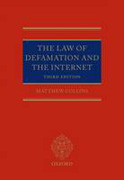
The Internet has revolutionized the way in which we communicate. We take instantaneous, affordable, global communication for granted. With the remarkable benefits the Internet confers, however, come concomitant dangers and abuse. TheInternet is, at the same time, a bulwark for global freedom of expression, and a medium of potentially limitless international defamation. The once sharp lines between the old and new media are blurring faster than could have been imagined a few short years ago. Television, radio, telecommunications, and the print media are increasingly delivered via Internet protocols. Mobile telephones, laptop computers, and the new generation of handheld devices provide always-on Internet access. The Internet is converging with, or displacing to a greater or lesser degree, and at an incredible pace, every other form of communication. The law of defamation and the Internet has thus become, in a very real sense, the modern law of defamation. The original edition of The Law of Defamation and the Internet (2001) was the first text to analyze comprehensively the application of common law principles of defamation law to material published online. It quickly became the standard text for media and information technologypractitioners and students seeking to understand this novel area of the law, a reputation cemented by the second edition (2005). The book has been widely cited and attracted praise throughout the common law world for its clarity and practical approach; its thorough treatment of the law; its use of international comparative material; and its analysis of relevant principles of jurisdiction and choice of law. The third edition takes The Law of Defamation and the Internet to a new level. As well as comprehensively updating the burgeoning law in the field, the coverage of general principles of defamation law has been significantly expanded. The research base has been widened to include more extensive coverage of authorities from jurisdictions including Canada, New Zealand, Ireland, Hong Kong, Malaysia, and Singapore. Other new features include expanded coverage of American law and an appendix of significant damages verdicts inInternet defamation actions. The new edition is an indispensable resource forall practitioners and students of defamation law. INDICE: I THE INTERNET REVOLUTION; 1. General Introduction; 2. The Internet; 3. Issues for Defamation Law; II THE CAUSE OF ACTION FOR DEFAMATION; 4. Libel and Slander; 5. Publication; 6. Intermediaries and Publication; 7. Identification; 8. Defamatory Meaning; III DEFENCES; 9. Justification; 10. Fair Comment and Related Defences; 11. Absolute Privilege; 12. Duty and Interest Form of Qualified Privilege; 13. Modifications of the Duty and Interest Form of Qualified Privilege; 14. Fair Reports Forms of Qualified Privilege; 15. Qualified Privilege and Malice; 16. Statutory Innocent Dissemination and Related Defences;17. Common Law Defence of Innocent Dissemination; 18. Other Defences; IV REMEDIES AND RELATED MATTERS; 19. Injunctions and Related Remedies; 20. Damages; 21. Vicarious Liability; 22. Recognition and Enforcement of Judgments in Foreign Countries; 23. Alternatives to Defamation Law; V EUROPEAN INFLUENCES ON THE LAW OF DEFAMATION; 24. Jurisprudence of the European Court of Human Rights; 25. Human Rights Act; VI JURISDICTION AND CHOICE OF LAW; 26. Grounds of Jurisdiction; 27. Forum Non Conveniens; 28. Choice of Law; 29. Proof of Foreign Law; VII ASPECTS OF UNITED STATES LAW; 30. Introduction to American Defamation Law; 31. Liability of Internet Intermediaries in the United States; 32. Jurisdiction and Choice of Law in the United States; APPENDICES; Appendix A: Selected Legislation; Appendix B: Damages Awards in Internet Defamation Actions
- ISBN: 978-0-19-959079-7
- Editorial: Oxford University
- Encuadernacion: Cartoné
- Páginas: 683
- Fecha Publicación: 01/01/2010
- Nº Volúmenes: 1
- Idioma: Inglés
